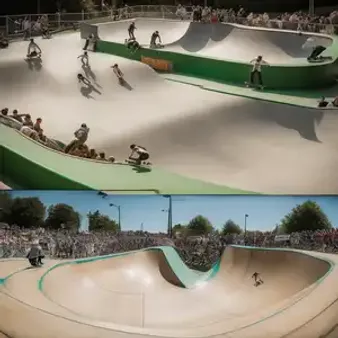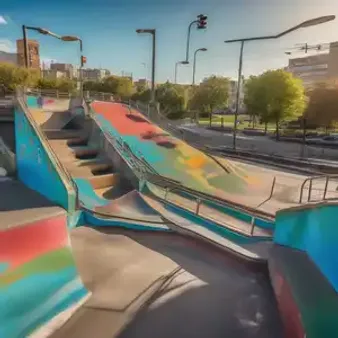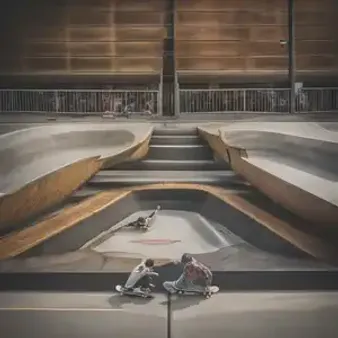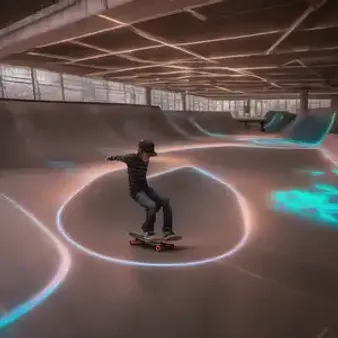Table of Contents
Welcome to kizworld, your ultimate resource for all things skating! In this comprehensive guide, we'll delve into the captivating world of official skate, exploring its history, disciplines, governing bodies, and what the future holds for this dynamic sport. Whether you're a seasoned skater or just curious about the world of competitive skating, this article will provide valuable insights and information.
Aspect | Details |
|---|---|
History | Origins, evolution of competitions, key milestones |
Disciplines | Street, park, vert, differences, rules, and scoring |
Governing Bodies | Major organizations, roles, and responsibilities |
Future Trends | Technological advancements, new disciplines, global reach |
The History of Official Skate Competitions
Imagine this: it's the 1960s, and skateboarding is just starting to gain traction. It's all about freedom, creativity, and pushing boundaries. Then, boom! The first official skateboarding competitions pop up, forever changing the landscape of the sport. These early contests were like the wild west – mostly downhill slalom and freestyle events where skaters showed off their coolest tricks, like handstands and "cosmic slides." It was a time of experimentation, where style was just as important as technical skill.
Fast forward to the 1970s, and skateboarding takes a giant leap with the invention of the urethane wheel. Suddenly, skaters could roll smoother, faster, and perform more complex tricks. This led to the rise of vert skateboarding, where skaters took to empty swimming pools and carved up the walls with their boards. Contests like the legendary Del Mar Nationals in 1975 showcased this new wave of talent, with skaters like Tony Alva and Jay Adams becoming household names. Check out our article on skate Tony Hawk to learn more about a legend who emerged in later years. This era marked a turning point, where official skate competitions transitioned from a niche hobby to a full-blown spectacle.
Decade | Key Developments |
|---|---|
1960s | First official competitions, focus on downhill slalom and freestyle |
1970s | Urethane wheels revolutionize skateboarding, rise of vert skateboarding, iconic competitions like Del Mar Nationals |
The 1980s saw skateboarding explode in popularity, with street skating taking center stage. Skaters began to view the urban landscape as their playground, grinding rails, ollieing over obstacles, and pushing the limits of creativity. Official competitions adapted, incorporating street elements into their courses. The emergence of iconic competitions like the X Games in the 1990s cemented skateboarding's place in mainstream culture, attracting a global audience and top-tier sponsors. From its humble beginnings to its current status as a global phenomenon, official skate competitions have played a pivotal role in shaping the sport's evolution, providing a platform for skaters to showcase their skills, push boundaries, and inspire generations to come. If you're curious about different types of skateboards, check out our post on WKND Skateboards.
The History of Official Skate Competitions
Key Disciplines in Official Skate
Official skate competitions are like a skateboarding buffet – there's something for everyone! You've got street skating, which is all about mimicking urban environments with rails, stairs, and ledges. It's like turning the city into your own personal skatepark, pulling off tricks that make people say "whoa!" Then there's vert skating, where you're flying high in a giant ramp, defying gravity with spins and flips. Think of it like skateboarding's version of acrobatics, with a healthy dose of adrenaline. And don't forget park skating, a mix of street and vert elements, where you're flowing through bowls and ramps, linking tricks together like a choreographed dance on wheels. Want to know more about this type of skating? Check out our article on and park skateboarding. Each discipline has its own unique flavor and challenges, attracting skaters with different styles and strengths.
Key Disciplines in Official Skate
Official Skate Governing Bodies and Organizations
Okay, so you're interested in official skate competitions? It's like a whole other world within skateboarding, with rules, rankings, and organizations that make sure everything runs smoothly. Think of it like the skateboarding Olympics! There are a bunch of organizations that oversee these competitions, setting the standards and making sure things are fair for all the skaters.
One of the big players is World Skate, which is like the United Nations of skateboarding! They're responsible for a ton of stuff, like developing the rules, organizing major international competitions like the World Skateboarding Championships, and even pushing for skateboarding to be included in the Olympics – which is super cool! Then you've got national organizations in different countries, like USA Skateboarding in the United States, which focuses on developing skateboarding programs and supporting skaters at all levels. These organizations are like the coaches and referees of the skateboarding world, making sure everyone plays by the rules and has a chance to shine! Want to find out more about skateboarding in the UK? Check out our article on buy skateboard UK.
Organization | Role |
|---|---|
World Skate | International governing body, sets rules, organizes competitions, promotes skateboarding |
National Organizations (e.g., USA Skateboarding) | Develops programs, supports skaters, organizes national competitions |
Now, just like in any sport, these organizations have to deal with some challenges. One of the big ones is making sure judging is fair and consistent. Imagine trying to compare a super technical street run with a high-flying vert routine – it's like comparing apples and oranges! So, these organizations are constantly working on ways to make judging more objective and transparent, using things like video replays and detailed scoring systems. It's all about making sure the best skaters get the recognition they deserve!
Another big challenge is keeping up with the ever-changing world of skateboarding. New tricks are being invented all the time, and the sport is constantly pushing boundaries. So, these organizations have to be flexible and adapt their rules and competition formats to reflect these changes. It's like trying to hit a moving target! But hey, that's what makes skateboarding so exciting – it's always evolving, always pushing the limits, and always keeping us on our toes! If you're a beginner, our post on how to get started with skateboarding as a beginner is a great resource.
- Fair and Consistent Judging
- Adapting to Skateboarding's Evolution
Official Skate Governing Bodies and Organizations
Official Skate: Future Trends and Innovations
Official skate is like that friend who's always coming up with wild new ideas! It's constantly evolving, pushing the limits of what's possible on a skateboard. One of the coolest things on the horizon is the use of technology to enhance judging and training. Imagine sensors on skateboards that can track the speed, height, and angle of tricks – it's like having a super-smart referee who never misses a beat! This tech can help make judging more objective, ensure fairness, and provide skaters with detailed feedback to improve their performance. It's like having a personal skateboarding coach in your pocket!
Another exciting trend is the rise of virtual skate competitions. Think video games, but with real-life skaters competing against each other from anywhere in the world! This opens up a whole new world of possibilities, allowing skaters to connect, compete, and push their skills without geographical limitations. It's like having a global skatepark right in your living room! Plus, virtual competitions can make skateboarding more accessible to people who might not have access to traditional skateparks or competitions. It's like breaking down barriers and inviting everyone to join the skateboarding party!
Trend | Impact |
|---|---|
Technology-Enhanced Judging and Training | More objective scoring, detailed feedback for skaters |
Virtual Skate Competitions | Global accessibility, new opportunities for competition and connection |
The Rise of Adaptive Skateboarding
Remember that time you saw someone do something amazing on a skateboard and thought, "I wish I could do that!"? Well, official skate is becoming more inclusive, making it possible for people of all abilities to experience the thrill of competition. Adaptive skateboarding is gaining momentum, with specialized equipment and events for skaters with disabilities. It's like building a bigger skatepark where everyone is welcome, regardless of their physical challenges. This movement is not only inspiring but also highlights the incredible resilience and determination of adaptive skaters who are pushing boundaries and redefining what's possible on a skateboard. For more information about skateboards, check out our article on WKND Skateboards.
The Global Expansion of Official Skate
Official skate is like that cool new band that's spreading its music all over the world! It's no longer just a Western phenomenon – skateboarding is gaining popularity in Asia, Africa, and South America. This global expansion is bringing fresh perspectives, styles, and talent to the sport, creating a more diverse and vibrant skateboarding community. It's like a giant skate jam where people from all walks of life come together to share their passion for skateboarding! This growth also means more opportunities for skaters from all corners of the globe to compete at the highest level, inspiring a new generation of skateboarders and pushing the sport to even greater heights. Looking for ways to improve your skateboarding skills? Check out our article on how to train like a skateboarder.
- Skateboard Back Pack
- Skate Tony Hawk
- WKND Skateboards
Official Skate: Future Trends and Innovations
Final Thought
Official skate continues to evolve, captivating audiences with its blend of athleticism, artistry, and technical prowess. As new trends emerge and technologies advance, the sport promises even more excitement and innovation in the years to come. Whether you're a participant or a spectator, official skate offers a unique and compelling window into the world of competitive sports.